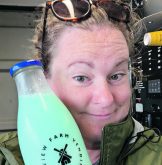Q:Dear Mr. Andrews. A few years ago, our niece and her husband adopted a young baby.
The child has always been a bit slower than other children his age appear, but no one thought much about it until (recently, just before schools were closed up) when his Grade 1 teacher sent a note home to the family asking for a meeting with his parents.
Apparently, his teacher believes that the child is struggling with fetal alcohol syndrome and wants his parents to refer the child to the school psychologist for an assessment.
Read Also

Agri-business and farms front and centre for Alberta’s Open Farm Days
Open Farm Days continues to enjoy success in its 14th year running, as Alberta farms and agri-businesses were showcased to increase awareness on how food gets to the dinner plate.
This has caught all of us off guard. I do not know much about fetal alcohol syndrome and I am not sure what we can do to support my niece and her husband as they go through what seems likely to be a trying time. Can you help us here?
A: Thank you for your letter. Fetal alcohol syndrome, or FAS, is a developmental disorder found in the growing fetus of a mom who has been drinking during her pregnancy.
The fetus, and the resulting newborn child, generally has a low birth weight, is often not responsive to his or her environment and frequently struggles with learning tasks.
It is a complicated disorder, one that is not easily diagnosed, and one that a public school teacher should not be making.
The job of the teacher is to record the concerning behaviour of the child and let someone with more appropriate training review that behavior and determine whether or not the child is struggling with FAS. The most likely diagnostician for FAS is a neurologist.
Part of the problem is that diagnosis often depends on the admission by the birth mother that she was drinking during the pregnancy. Any amount of drinking can be problematic, especially during the first trimester, and can continue to be so during the entire pregnancy.
FAS is a neurological condition. Neurological development occurs during the entire pregnancy, meaning that at no time is the womb safe from alcoholic ingestion. The fetus is vulnerable. Pregnant moms are advised to abstain from alcohol at least until the birth of the child.
Because diagnostics are difficult for the developing fetus and the growing child, the extent to which FAS is present throughout our communities is not well known. Estimates suggest that about 40,000 newborn babies are challenged per year in the United States. That would put Canada’s figures at about 4,000.
I hope your niece is taking her adopted child to spend time with her family physician and later to be referred to a pediatric neurologist.
I hope, also, that she has information about the birth mother and will be able to tell her medical team whether or not the birth mother was likely drinking during the pregnancy.
Any information she can find about the birth mother will be helpful.
If indeed the child is struggling with FAS, your niece will need all of the support you can give her.
FAS is a condition. It is not a disease and it will not be cured. But given the right programs and a ton of support from family and friends, both your niece and her adopted son can learn survival skills and build a life for the boy that can be rewarding and productive.
You have heard it before: “it takes a community to raise a child.”
Nowhere is this more true than it is for our FAS kids.
Jacklin Andrews is a family counsellor from Saskatchewan. Contact: jandrews@producer.com.














